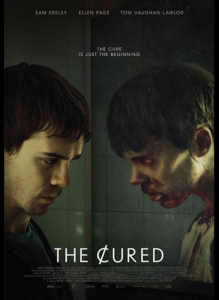George Romero told me in an interview once that he never thought of his undead as zombies. He originally called them “flesh eaters.” It was a film critic, he said, that called the zombies. To his surprise, that name stuck. And even today, filmmakers use the zombie genre to comment about society in a variety of thoughtful ways. The fact that the infected, the zombies, are also flesh eaters is just expected.
“ The Cured” is an integration story masquerading as a zombie
The Cured” is an integration story masquerading as a zombie  picture. And while we get plenty of gruesome, bloody moments, the real horror is intolerance. The real monsters are the frightened non-zombies, who would rather kill and destroy, over finding understanding that might lead to the real cure.
picture. And while we get plenty of gruesome, bloody moments, the real horror is intolerance. The real monsters are the frightened non-zombies, who would rather kill and destroy, over finding understanding that might lead to the real cure.
In Irish made “The Cured,” following an outbreak that turns people into zombies, a medical cure is miraculously discovered. Slowly, the cured are returned to society only to discover that they aren’t wanted or trusted anymore. While caution is understandable, most of those who survived the outbreak without becoming zombies just aren’t comfortable around their former loved ones who are now somewhat free of the disease. The returned occupy a place on the fringes and are considered not quite human enough to be worthy of any position of authority that they once may have inhabited.
The former zombie, the cured, is now the other.
Ellen Page (“Juno”) stars as a single mother, whose husband was a zombie victim. When her brother-in-law, Senan (Sam Keeley), returns having been cured, she has to learn to live with what he may or may not have done as a zombie. One interesting concept is that once cured of the disease, the survivor remembers the terrible things that he or she did as a zombie. This naturally brings little joy to Senan, who feels responsible for the death of his beloved brother. And the military state that now governs his every move offers little support and understanding.
Senan’s sole friend is the dark Conor (Tom Vaughan-Lawlor). Before becoming a zombie, Conor was a member of a well-off family and had a job in government. But now, he has been forced to work as a janitor. Not even his father will give him the time of day. Ostracized, Conor begins to organize his fellow cured under the guise of a support group. His meetings resemble Alcoholics Anonymous. These scenes are as interesting as they are scary and subversive. And Vaughan-Lawlor is excellent as the charismatic Conor, a leader with an agenda that if channelled might hold the key to controlling the still present zombie threat.
Working from his original script director David Freyne’s “The Cured” is a very impressive feature film debut. While he certainly owes a lot to Romero, the zombie concept is but a device onto which an integration narrative is fashioned. And although horror fans will be satisfied with the zombie kills that inevitably take place, this is a science fiction film as much as a work of horror.
While “The Cured” is no “Ex Machina,” comparisons to what writer/director Alex Garland has been doing are not too far off. Freyne is going for something deeper here—more than just action and splatter gore. And he largely succeeds, especially in that the film should generate discussions about what it takes to solve a problem. Finding the cure is more than just creating the right medicine cocktail, it takes tolerance.
“Night of the Living Dead” turns 50 years old this year. It and Romero’s fantastic follow-up “Dawn of the Dead” are two of my favorite films. Like the undead themselves, the zombie, or whatever you call it, genre is still very must alive and well. And when a thoughtful story like “The Cured” takes advantage of the zombie elements, we can be inspired to talk about larger questions that actually confront us. Fear of the other is a disease still in need of a cure.
